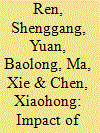|
|
|
Sort Order |
|
|
|
Items / Page
|
|
|
|
|
|
|
| Srl | Item |
| 1 |
ID:
132695


|
|
|
|
|
| Publication |
2014.
|
| Summary/Abstract |
This paper employs the input-output (IO) approach to analyze the scale and structure of embodied carbon emissions of China×s 19 industry sectors during 2001-2011 and constructs a regression model to establish the relationship between energy intensity, per capita output, trade openness, foreign direct investment (FDI), trade comparative advantage, environmental regulation, technology, and CO2 emission intensity. Our results suggest that: China×s international embodied carbon emission balance has been in a state of continuous growth for the period 2001-2011, and China has become a pollution haven; the relationship between per capita output and CO2 emission is inverse N-typed and China×s industries are in the rising stage of the curve; FDI and trade comparative advantage are two main elements boosting China×s carbon emissions; trade openness, environmental regulation, and technology will lower the growth rate of China×s industrial carbon emissions (ICEs). Consequently, China×s policies should center on adjusting the industry structure and scale of FDI inflows, transforming industries with trade comparative advantages into a clean type, facilitating environmental regulation level, and bringing in and developing low-carbon technology to avert China from being a pollution haven.
|
|
|
|
|
|
|
|
|
|
|
|
|
|
|
|
| 2 |
ID:
163554


|
|
|
|
|
| Summary/Abstract |
This paper examines how exposure to messages about the cause of seasonal air pollution in Korea influences the Korean public's satisfaction with efforts to address the problem. It also assesses the impact of frames that accentuate the costs and benefits of the nation's coal usage on individuals’ support for coal-based energy development. It draws from framing theory to develop hypotheses tested in two distinct survey experiments that recruited a representative sample of residents living in the Seoul Metropolitan area. We find that frames that highlight the need for immediate policy action, by blaming China, Korea or both nations, decreases satisfaction with existing national efforts. Moreover, frames that attribute blame exclusively to China decrease satisfaction with China's efforts to combat the problem. On the domestic front, we find that Koreans’ views toward increased coal use are a function of exposure to a coal-costs or coal-benefits frame; however, when the frames appear simultaneously in competition, considerations about the economic benefits overpower concerns about the negative health effects. The results emphasize how frames can shift perceptions about the need for policy action as well as in securing public support or opposition toward a specific “polluting” energy source.
|
|
|
|
|
|
|
|
|
|
|
|
|
|
|
|
|
|
|
|
|